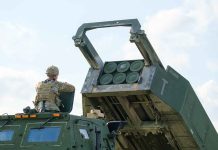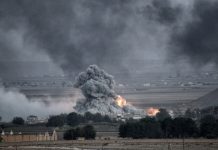
U.S. forces have unleashed a formidable wave of airstrikes on ISIS targets in Syria, a bold move in the post-Assad geopolitical landscape.
At a Glance
- Rebel forces capture Damascus, leading to Assad’s ousting.
- U.S. Air Force conducts over 75 airstrikes against ISIS in Syria.
- General Kurilla emphasizes the importance of accountability for ISIS supporters.
- Russia’s strategic assets at risk following Assad’s fall.
The Collapse of the Assad Regime
The sudden capture of Damascus by Syrian rebels has led to the toppling of President Bashar al-Assad, who sought asylum in Moscow. President Joe Biden acknowledged this shift as a “moment of historic opportunity for the long-suffering people of Syria”. The collapse signifies a shift in Middle Eastern power dynamics, affecting regional alliances and influencing global geopolitical strategies.
While the Syrian people celebrate, the fall leaves a dangerous power vacuum. Extremist groups like Hayat Tahrir al-Sham (HTS) are vying for control, posing a threat that demands careful monitoring.
https://twitter.com/centcom?lang=en
U.S. Military Response
In response to the threat of ISIS resurgence, the U.S. Central Command (CENTCOM) launched over 75 precision airstrikes targeting ISIS camps and key operatives in Syria. The U.S. Air Force, maintaining a strategic and precise approach, reported no civilian casualties. This showcases their dedication to ensuring minimal collateral damage while effectively dismantling ISIS infrastructure.
“U.S. Secretary of State Antony Blinken said today that the Syrian people ‘finally have a reason for hope,’ saying in a statement that the U.S. supports a peaceful transition of power ‘through an inclusive Syrian-led process.'” – U.S. Secretary of State Antony Blinken
General Michael Erik Kurilla emphasized the accountability of ISIS supporters amidst the tumultuous situation. The U.S. remains committed to disrupting ISIS’s ability to plan and execute operations that could jeopardize regional stability.
Strategic Implications for Global Powers
Assad’s collapse represents a monumental setback for both Russia and Iran, shifting the power balance and creating strategic vulnerabilities. Russia’s failure to maintain its influence in Syria is viewed as a significant strategic defeat, impacting its military commitments, especially with ongoing involvement in Ukraine.
With the regime’s downfall, the U.S. and Israel consider fortifying alliances with moderate Arab states to counterbalance escalating extremist threats. This new chapter also presents leverage in diplomatic negotiations with Russia, particularly regarding the Ukraine crisis.






















